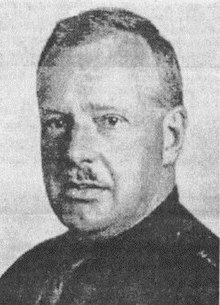Arnold Leese
| Arnold S. Leese | |
|---|---|

Leese at an unspecified date
|
|
| Born |
Arnold Spencer Leese 1878 Lytham St Annes, Lancashire, England |
| Died |
c. 1956 (aged 77–78) London, England |
| Nationality | British |
| Alma mater | Giggleswick School |
| Occupation | Veterinarian |
| Known for | Anti-Semitic writer and activist |
| Notable work | A Treatise on the One-Humped Camel in Health and in Disease (1927), My Irrelevant Defence (1938), Out of Step: Events in the Two Lives of an Anti-Jewish Camel Doctor (1951) |
| Home town | Stamford, Lincolnshire |
| Political party |
British Fascists Imperial Fascist League |
Arnold Spencer Leese (1878–1956) was a British fascist politician and veterinarian. Leese was initially prominent for his veterinary work and was noted for his study of camels. Known for his virulent anti-Semitism, Leese led his own fascist movement and was a prolific author and publisher of polemics both before and after the Second World War.
Leese was born in Lytham St Annes, Lancashire, England and educated at Giggleswick School. An only child, his childhood was characterised by loneliness. Leese was a nephew of Sir Joseph Francis Leese, 1st Baronet.
After qualifying as a veterinary surgeon, he accepted a post in India, where he became an expert on the camel. He had previously worked in the East End of London. He worked in India for six years before becoming Camel Specialist for the East Africa Protectorate of the British Empire. He published articles on the camel and its maladies, the first appearing in The Journal of Tropical Veterinary Science in 1909. He was recognised as a leading authority on the camel. A camel parasite, Thelazia leesei was named after him.
He was commissioned in the Royal Army Veterinary Corps in 1914, serving on the Western Front and in the Middle East. Captain Leese returned to England where he continued his practice, publishing A Treatise on the One-Humped Camel in Health and in Disease (1927), which would remain a standard work in India for fifty years. He settled in Stamford, Lincolnshire, practising as a vet until retirement in 1927.
In Stamford Leese became close to one of his neighbours, the economist Arthur Kitson, who was also a member of The Britons. Kitson persuaded Leese that control of money was the key to power and further convinced him that money was controlled by the Jews, with Kitson also supplying Leese with a copy of the . As an animal lover Leese also claimed that the kosher style of slaughter practised in Judaism influenced his anti-Semitism. Around the same time Leese also became interested in Italian fascism and, after writing a pamphlet entitled Fascism for Old England, he joined the British Fascists in 1924. He also joined the Centre International d'Études sur la Fascisme, an Italian-led group aimed at the promotion of fascism internationally, and served as its British Correspondent. He was elected as a councillor in Stamford that year, along with fellow fascist Henry Simpson. In his autobiography, Leese wrote "we were the first constitutionally elected Fascists in England". He was generally unsatisfied with the policies of the group however, dismissing them as "conservatism with knobs on".
...
Wikipedia
